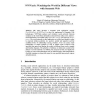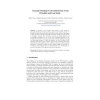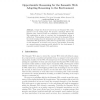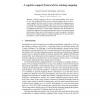111
Voted
SEMWEB
2007
Springer
15 years 8 months ago
2007
Springer
A new paradigm in Semantic Web research focuses on the development of a new generation of knowledge-based problem solvers, which can exploit the massive amounts of formally speciï¬...
120
Voted
SEMWEB
2007
Springer
15 years 8 months ago
2007
Springer
This paper develops a Semantic Web application, namely WorldWideWatch or WWWatch, in short. By employment of Semantic Web technologies, WWWatch analyses and visualizes social netwo...
131
Voted
SEMWEB
2007
Springer
15 years 8 months ago
2007
Springer
As claimed in the Semantic Web project, a huge amount of physically distributed interacting software agents could find the semantic of available resources and answer more relevantl...
101
Voted
SEMWEB
2007
Springer
15 years 8 months ago
2007
Springer
A lot of functionality is needed when an application, such as a museum cataloguing system, is extended with semantic capabilities, for example ontological indexing functionality or...
118
click to vote
SEMWEB
2007
Springer
15 years 8 months ago
2007
Springer
Despite the eï¬orts devoted so far, the Semantic Web vision appears to be an eluding target. We propose a paradigm shift for the Semantic Web centred around the pragmatics of deve...
108
Voted
SEMWEB
2007
Springer
15 years 8 months ago
2007
Springer
In this paper we take a view from the bottom to RDF(S) reasoning. We discuss some issues and requirements on reasoning towards eï¬ectively building Semantic Web Pipes, aggregating...
SEMWEB
2007
Springer
15 years 8 months ago
2007
Springer
This paper argues that a signiï¬cant part of todayâs Semantic Web research is still dominated by ideas from centralized databases. Furthermore, the main thread of reasoning rese...
106
click to vote
SEMWEB
2007
Springer
15 years 8 months ago
2007
Springer
Revyu.com is a live, publicly accessible reviewing and rating Web site, designed to be usable by humans whilst transparently generating machinereadable RDF metadata for the Semanti...
127
click to vote
SEMWEB
2007
Springer
15 years 8 months ago
2007
Springer
SMART (Semantic web information Management with automated Reasoning Tool) is an open-source project, which aims to provide intuitive tools for life scientists for represent, integr...
101
Voted
SEMWEB
2007
Springer
15 years 8 months ago
2007
Springer
Abstract. Ontology mapping is the key to data interoperability in the semantic web. This problem has received a lot of research attention, however, the research emphasis has been m...




